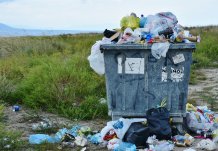Articles

The centre will look at plastic waste
£1 million circular economy research hub at the University of Exeter to re-think plastics production and use
The University of Exeter has been awarded £1 million to create a new centre to tackle the use of plastic and plastic waste.
The Exeter Multidisciplinary Plastics Research Hub (ExeMPLaR) is one of eight prestigious new research projects across the UK to have been announced today by the Science Minister, Chris Skidmore. The eight projects will see researchers investigating alternatives to fossil-based materials for plastics, as well as looking into the complex factors involved in the life cycle of plastic materials, from consumers’ and business’ needs and behaviours, to how to use technology to reclaim or break down plastics.
ExeMPLaR will combine the expertise of academics from across the University who will also work alongside a large number of partners, including public bodies, businesses and the public sector. This requires a whole systems approach and a shift in mind-set from a linear take-make-dispose to a circular economy model.
“This is about academics working hand in hand with public bodies and industry to find real, practical solutions to some of the current issues surrounding plastic use and pollution,” said Professor Peter Hopkinson, Director of the University’s Centre for Circular Economy within the Business School, who is the co-lead of ExeMPLaR.
“This is not about eliminating all plastics – some plastic is used in highly valuable applications which would be hard to replace. Our approach is to develop regional circular plastics systems in which we design out plastic waste at the outset and design the system to enable plastics to be re-used at their highest value for the longest period.”
Ecotoxicologist Professor Tamara Galloway, who is the co-lead on ExeMPLaR and has carried out extensive research into the impact of plastics on the marine environment said: “This will be an excellent opportunity to work towards solutions for reducing the amount of waste material that ends up being discarded into the environment every year. Plastics are fantastic materials with a myriad of uses in modern society; what we need to do is find better, more sustainable ways of using them”.
Through the recently published Bioeconomy Strategy, part of the modern Industrial Strategy, the government has identified producing less carbon intensive products, including plastics, as a key challenge area alongside reducing plastic waste. This will lead to a circular economy where greater emphasis is placed on ‘use, reuse and recycle.’
Science Minister, Chris Skidmore said: “We have all seen the devastating effects that plastics waste has on our environment, threatening the biodiversity of our oceans and introducing micro plastics into the food chain.
“We are committed to tackling this problem, from developing a plastic-eating bacteria to finding new ways to recycle. These projects have the potential to lead us to a cleaner, greener economy but also ensure the UK is at the forefront of the latest innovations and products that will be in high demand across the world through our modern Industrial Strategy.”
The announcement comes on the day that the government has unveiled its Resources and Waste Strategy. Among other initiatives, the Strategy puts the legal onus on producers of damaging waste, introduces a consistent set of recyclable materials collected from all households and businesses, and introduces a deposit return scheme, subject to consultation, to increase the recycling of single-use drinks containers.
The eight projects were successful in the Creative Circular Economy Approaches to Eliminate Plastics Waste competition, and are among the first to be funded through the Plastics Research Innovation Fund (PRIF).
The Fund, managed by UK Research and Innovation, is engaging Britain’s best scientists and innovators to help move the country towards more circular economic and sustainable approaches to plastics.
It is delivered via the Engineering and Physical Sciences Research Council (EPSRC), Innovate UK, with strategic oversight from Professor Duncan Wingham, Executive Chair of the Natural Environment Research Council (NERC).
Professor Duncan Wingham, UK Research and Innovation’s Lead for the Plastics Research Innovation Fund and Executive Chair of the Natural Environment Research Council, said: “These eight multidisciplinary research projects will lead the way in finding new solutions to our current use of plastics, through recycling methods and developing alternative materials. UKRI is drawing UK researchers together with companies to address the challenge of reducing plastic waste entering the environment and creating an economy that is free from plastic waste.”
Date: 18 December 2018
